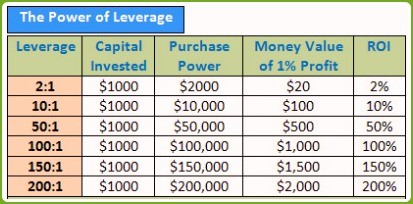- US employment down, Non-Farm Employment Change is up. Why is the EUR/USD price still going up?
- Error 134 when the account balance has enough funds
- Range Bar Chart on MT4
Forum on trading, automated trading systems and testing trading strategies
How to Start with Metatrader 5
Sergey Golubev, 2016.06.22 07:36
How to Trade - Forex Leverage (based on the article)
Leverage in forex is expressed as ratios - for example as the following: 1:1, 1:50, 1:100, 1:200, 1:400.

Leverage in forex = Purchase Power/Capital Invested = $100,000/$1,000 = 100
This leverage ratio of 1:100 is translated as following:
For every $1 I deposit in my forex broker's account, my broker in return deposits $100 in my margin account. So, if I deposit $1000 then my broker deposits $100,000 in my trading account. So with just $1000 of my own money, I can control $100,000 for my trading purposes. By doing so I created a leverage in forex.
"Leverage has been in use from the early dawn of our civilization
primarily to cope up with daily necessities. In the medieval era
leverage was employed probably just to lift heavy stones to build
houses. But in the modern era leverage has been used extensively in
finance and commerce. When I am buying
one million dollar house with only 10% down payment, I am essentially
using leverage. Leverage adds glamor to forex trading. It is what makes
so many traders gravitate to forex trading as compared
to equities and other securities market."
"Hence, leverage in forex is the secret behind huge wind fall profits in forex trading. Be that as it may, leverage can magnify losses in losing trades. This is also why leverage is considered double edged sword. If I make winning trades using leverage then my profits are huge. Likewise if I make losing trades my losses are also huge."
Forum on trading, automated trading systems and testing trading strategies
Sergey Golubev, 2014.01.23 11:01
Margin Call (adapted from dailyfx.com article)
- A Short Introduction to Margin & Leverage
- Causes of Margin Calls
- How to Avoid Margin Calls
To get a grasp on what a margin call is, you should understand the
purpose and use of Margin & Leverage. Margin & Leverage are two
sides of the same coin. The purpose of either is to help you control a
contract larger than your account balance. Simply put, margin is the
amount required to hold the trade open. Leverage is the multiple of
exposure to account equity. Therefore, if you have an account with a
value of $10,000 but you would like to buy a 100,000 contract for
EURUSD, you would be required to put up $800 for margin in an account
leaving $9,200 in usable margin. Usable Margin should be seen as a
safety net and you should protect your usable margin at all costs.
Causes of a Margin Call
To understand the cause of a margin call is the first step. The second
and more beneficial step is learning understanding how to stay far away
from a potential margin call. The short answer as to understand what
causes a margin call is simple, you’ve run out of usable margin.
The second and promised more beneficial step is to understand what
depletes your usable margin and stay away from those activities. In risk
of oversimplifying the causes, here are the top causes for margin calls
which you should avoid like the plague (presented in no specific
order):
- Holding on to a losing trade too long which depletes Usable Margin
- Overleveraging your account combined with the 1st reason
- An underfunded account which will force you to over trade with too little usable margin
What Happens When A Margin Call Takes Place?
When a margin call takes place, you are liquidated or closed out of your
trades. The purpose is two-fold: you no longer have the money in your
account to hold the losing positions and the broker is now on the line
for your losses which is equally bad for the broker.
How to Avoid Margin Calls
Leverage is often and fittingly referred to as a double-edged sword. The
purpose of that statement is that the larger leverage you use to hold a
trade greater than some large multiple of your account, the less usable
margin you have to absorb any losses. The sword only cuts deeper if an
over-leveraged trade goes against you as the gains can quickly deplete
your account and when your usable margin % hits, zero, you will receive a
margin call. This only gives further credence to the reason of using
protective stops while cutting your losses as short as possible.
- Free trading apps
- Over 8,000 signals for copying
- Economic news for exploring financial markets
You agree to website policy and terms of use